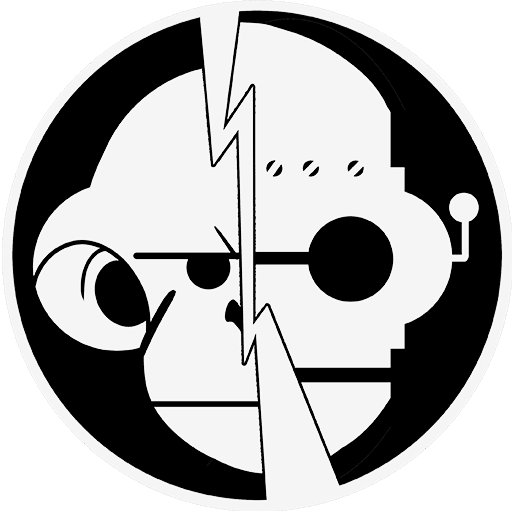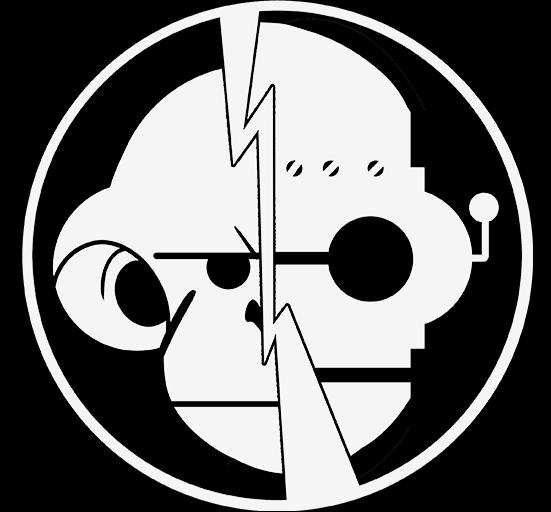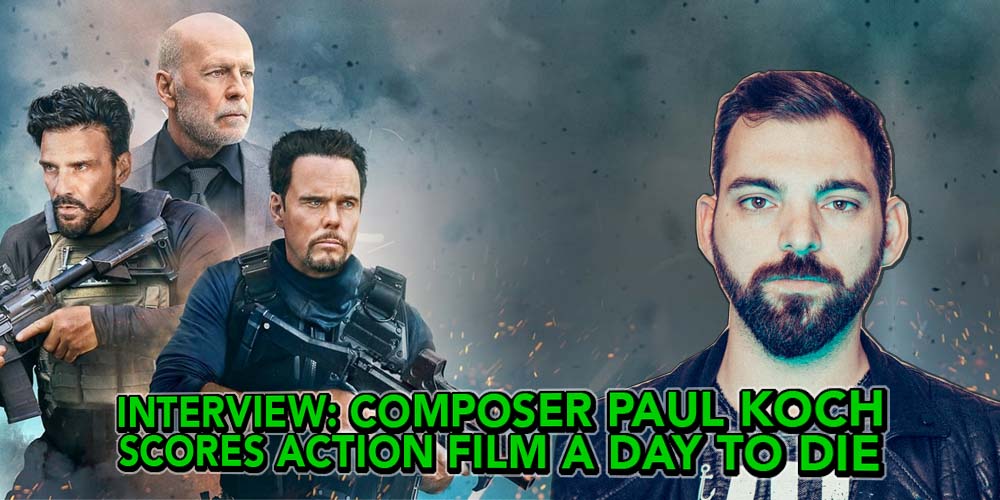Kevin Dillon, Frank Grillo, and Bruce Willis star in A Day To Die, an action film from director Wes Miller (Hell on the Border, River Runs Red) about an ex-military ops officer trying to save his wife from a local gang leader. Composer Paul Koch created the riveting music that underscores the film.
Conner Connolly (Dillon) has to assemble some old friends after a gang leader kidnaps his pregnant wife Candice (Brooke Butler). Pettis is the gang leader played by Leon Robinson (City on a Hill), who expects Conner to pay two million dollars for killing a friend. So Conner calls upon his Mason, inhabited by Frank Grillo (Boss Level), to help pull off a series of heists to pay off the debt.
PopAxiom and Paul Koch spoke about his career as a composer and making the music for the action thriller A Day To Die.
Music Like This
Paul’s musical journey “started in third grade on the recorder … next year, we got to pick our instrument. I wanted to play the drums, but my grandfather wasn’t into the idea; my teacher suggested the bass. She said there were a lot of drummers and guitar players, but everyone always needs a bass.”
How did Paul take to the bass? “I loved it,” he declares, then adds, “As it turns out, people did need a bass player, and it worked out well for me.”
“I was in bands all through high school. Ska and punk bands,” he says. The process of recording albums drew him in. “I fell in love with being in the recording studio. I went to Berklee College of Music with the intent of opening up a recording studio.”
At college, Paul discovered another passion. “They had an intro to film scoring class. I loved John Williams and saw him with the Boston Pops performing all his movie music.” However, being a composer “never felt like something that just anybody could do. It felt like one of those jobs done by these entities who create music. So I took the class, and it seemed like my speed was more. I loved the idea of creating music like this.”
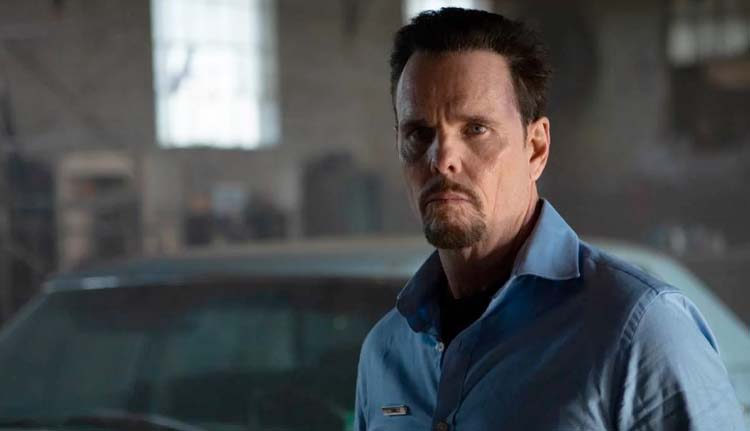
Friends
“I was in college watching all sorts of indie movies and fell in love with the music of things like Punch Drunk Love, Eternal Sunshine For The Spotless Mind, and I Heart Huckabees,” Paul explains his transformation into seeing composing in a new light.
Those three films didn’t feature “the sort of big orchestral stuff that I was used to. I didn’t think you could have these smaller, band-type scores.” To Paul’s surprise, he “learned that all those movies were from Jon Brion. I was so excited to learn about composers who go in this other direction that feels much more obtainable. So, that’s what I did. I went full into that craft and haven’t looked back.”
Paul scored the short film The 30 Bones of Unfortunate Joey Jones in college, which was one of “two avenues” leading him to where he is today. “I scored that short for my cousins who were film students at Emerson.”
“I moved out to LA and took an internship with John O’Brien and Dave Kushner of Velvet Revolver,” he says about avenue number two. “They were doing a TV show on ABC called Detroit 187. I interned on that show and worked with them for about a year. Tragically, John O’Brien passed away, but they took me in as a friend and part of the family. I’ve been working with that extended circle of friends ever since. I’ve had the opportunity to work on things like Scandal and Weird City because these friends recommending me to new friends.”
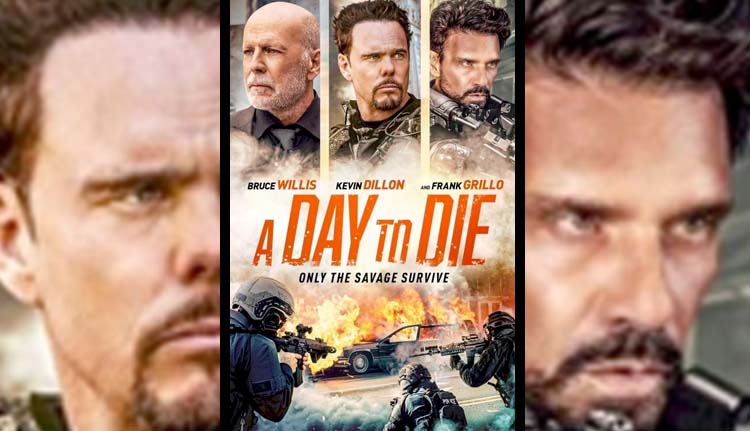
About A Day To Die
Paul’s circles also brought A Day To Die into his radar. “’30 Bones’ leads directly to A Day to Die. I kept working with that team again and again. Finally, I scored a movie called The Block Island Sound. I met Andrew van den Houten, a producer on A Day To Die. From college to this film, it’s one big circle.”
Composers often come in when a project is in post-production, but Paul says for A Day To Die, “I came in early. I read the script and loved it. I saw a lot of musical opportunities in it. So I ended up writing some of the music based on the script. I showed it to [director] Wes Miller, who liked it and thought we were on the same page with what this film could be musically.”
“I put myself through action movie film school,” he shares. “Every night when my wife and son went to sleep, I’d sit down with some great action movie. I did that for a couple of months to get that vibe fresh in my brain. That way, I could feel connected to the genre as much as possible.”
After the initial suite of themes based on the script, Paul didn’t do any more writing until he saw the film. “At that point, it was close to the locked cut. So I started with the beginning and this opening prologue that’s ten minutes long. It brings together a lot of the thematic elements of the film. I thought it would be a good place to start to get the sound for all the different characters. So that ended up as the secondary suite that I could pull ideas from for the rest of the film.”
Subtle
“There was a temp track,” he says, “I like temp tracks. A famous quote says, ‘talking about music is like dancing about architecture.’ There are only so many ways to say what you want musically, and you just have to hear it. The temp track pulled from many different movies in the same vein. I like to listen to all of it then talk to the director to understand what about that music he likes or doesn’t like.”
Paul admits that not all temp tracks are created equal. “Luckily, the temp track was good. It can be hard when they’re not so good. But it can also be hard if they’re too good.” But, of course, he’s talking about the dreaded ‘temp love.’ “The editing process is long, so it’s hard to hear the same thing for long stretches, then there’s a whole other set of sounds that changes the flow.”
“There’s something to be said about familiarity,” he says about the leading cause of temp love. “Hopefully, you accomplish the same thing and get the same type of feeling. The great thing about an original score is that you can play on these tiny moments in a way that a temp track can’t. All the little decisions that the actors are making allow you to have the music make subtle comments.”
Wrapping Up
Paul plays the guitar and bass, plus several other instruments, but his process never begins on the same device. “It depends on the type of film. I usually like to start with sounds. Before a movie starts, I’ll often experiment with sounds—no melodies or themes. If I were to score a romantic comedy, I think I’d probably start at the piano. I play another hundred instruments terribly, but that’s the best for horror films.”
John Williams and Jon Brion are huge influences on different sides of the composing spectrum. Paul names two more disparate music-makers. “Thomas Newman always surprises me. They’re always unique and elegant. Trent Reznor and Atticus Ross do something that few other people do. They focus so much on sound creation.”
“I’m a huge James Bond fan,” he says about a dream project. “That’s my number one franchise.”
Paul recently finished “a theme park-adjacent project that I hope I can talk about soon. I’m also working on a new album that’s an electronic-classical side project with my friend . It’s usually piano and string quartet with synths and drum machines. It’s called Moonrock.
Is A Day To Die on your watch list?
Thanks to Paul Koch and Impact24 PR
for making this interview possible.
Find more interviews from Ruben R. Diaz!
